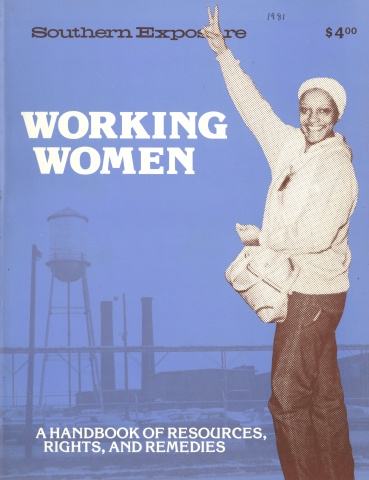Southeast Women's Employment Coalition

This article originally appeared in Southern Exposure Vol. 9 No. 4, "Working Women: A Handbook of Resources, Rights, and Remedies." Find more from that issue here.
In mid-summer of 1979,40 women from nine states in the Southeast gathered in Tennessee for a meeting unique in time and focus. The subject of the meeting was “Women and Work,” and the participants were leaders and pioneers in struggles for economic equity for women in the South. The energy at the meeting sparked a resolution toward developing an ongoing collective effort that became the Southeast Women’s Employment Coalition (SWEC).
SWEC is a network of 14 community-based organizations in six Southern states. At the local level, each of these groups provides a variety of services to women employed or seeking employment. SWEC is a commitment by these women and organizations to coordinate regional organizing and advocacy efforts in the areas of job equity and economic opportunity. “SWEC is an engine for a collective vision whose practicality is rooted in local organizing and leadership development,” says SWEC coordinator Leslie Lilly.
SWEC strategies include building a regional network through a newsletter and regular meetings; education through sponsoring workshops on subjects such as federal contract compliance and fundraising; preparing women for leadership roles through the SWEC Leadership Development Program; and taking on organizing such as the federal highway construction campaign.
The SWEC Leadership Development Program provides direct training and support to women who are emerging as leaders in their communities in efforts for economic justice for women. SWEC provides a leadership development program tailored to each individual and her specific educational and skill needs.
The highway construction campaign illustrates how SWEC weaves together the experiences and needs of member groups into a fabric that maximizes the impact of a collective strategy. Many SWEC affiliates have programs that train and place women in nontraditional jobs in construction and the building trades. When these programs simply shared their experiences in training women for such jobs, they never touched the reality of discrimination and the flagrant violation by the companies of federal orders to hire more women. To attack this problem, SWEC prepared a massive assault targeting the federal construction industry. The model used was one developed by a SWEC affiliate, the Coal Employment Project, which had successfully opened the previously all-male coal mining industry to women (see page 47 for a profile of the Coal Employment Project.)
Through a coordinated research effort, information documenting widespread discrimination was collected, analyzed and released in four simultaneous news events sponsored by SWEC and its member groups around the South. Following the release of the SWEC study, two legal complaints — naming 32 of the South’s largest federal-aid contractors and 52 state Transportation Departments — were filed with the Office of Federal Contract Compliance of the Department of Labor and the U.S. Department of Transportation. Seventeen independent organizations which work for economic justice joined SWEC in this action, taken in November, 1980. To ensure the necessary monitoring and documentation of the experiences of the would-be women construction workers, SWEC secured a private grant to launch the Women’s Asphalt Alliance. Subcontracts were negotiated with three local organizations to carry out this special project.
In other organizing efforts, SWEC sponsored a meeting in February, 1981, to explore potential areas of cooperation between labor unions and women’s employment groups. A meeting is planned for January, 1982, to broaden the SWEC network and re-evaluate organizing and advocacy struggles in light of the Reagan administration and the erosion of equal employment protections.
To join the SWEC network, write or call:
Rt.5 Pisgah Pike
Versailles, KY 40383 (
606) 873-6440
A newsletter subscription is $3. T-shirts bearing the slogan “Ladies Asphalt Auxiliary S.E. Women Pave the Way” are available for $6. State size and color. Available in small, medium, large and extra large; red, black, light blue and green.
- Tobi Lippin
Tags
Tobi Lippin
Tobi Lippin is a community organizer living in Greensboro, North Carolina. She is former director of Women in the Work Force. (1981)